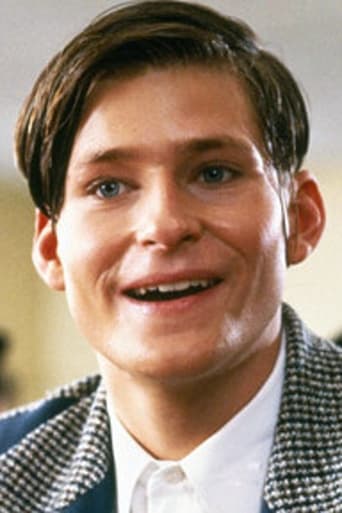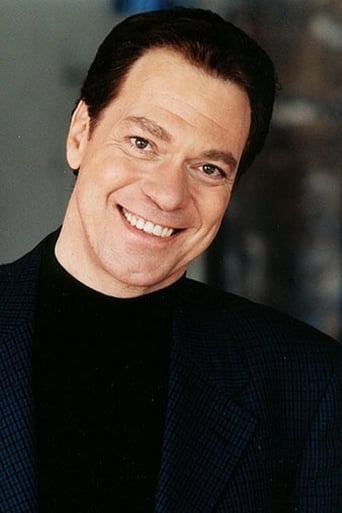Cubussoli
Very very predictable, including the post credit scene !!!
Grimerlana
Plenty to Like, Plenty to Dislike
FrogGlace
In other words,this film is a surreal ride.
Numerootno
A story that's too fascinating to pass by...
daniel-s-cochran
This past weekend while looking through films and shows to watch during a bit of free time, I happened upon this modernized version of the Bartleby story.The casting was wonderful for the parts. I would like to further explain all the details in great lengths as to shy you should take the time to watch this film. Um . . .Actually, now that I think of it . . ."I prefer not to." (Enjoyable piece) If you like a bit of dark comedy as it pertains to the corporate world, then this piece is for you.dsc
mcshortfilm
I loved this film and I cannot believe how so few critics liked it. What were they thinking? Apparently one critic thought since it was based on a short story that the film should be shorter. Of course, once one critic says its too long, every other critic has to agree. I guess David Mamet is an exception to the rule. Bartleby is not too long. It deserves it's running time so that we can absorb the story more closely. When we hear Bartleby repeat the same words: "I'd prefer not to" we are not given any explanation for the comment but yet it becomes extremely poignant. Eventually everyone in the office begins to use the word "prefer" and we see how Bartleby has affected the workplace like a disease. The film is very bizarre particularly because of the way the boss reacts to Bartleby. Instead of just firing the guy for not doing his job, he tries to reason with him. Eventually Barlteby gets in an even more bizarre predicament that has even more to do with just "prefering not to" work. The boss is obsessed with Bartleby and the film turns very Kafkaesque. We see a capitalist scenario where people topple on another for greed, power and respect. The film is based on the short story "Bartleby the Scrivener" by Herman Melville. It was appropriate to mention the source because the story seems very relevant not only to our modern culture but also to what Melville went after writing Moby Dick. The film also has a wonderful score with a Theramin instrument and a brilliant cinematography.
Robert J. Maxwell
Ordinarily when the industry tries to turn a short story like Melville's "Bartleby the Scrivener" (which I haven't read since high school) into a "major motion picture," you can forget about it. The kiss of death. You want to see an example, watch Hollywood's version of "The Snows of Kilimanjaro" sometime, especially the scene in which Gregory Peck receives a message -- that famous floating pregnant italicized first paragraph of Hemingway's -- and reads it aloud between guffaws in a smokey saloon midway through the film.I wasn't expecting much from this movie either. It has less action than Hemingway so I was prepared to switch channels on impulse. But I was surprised because it turned out to be very well done. Melville is often cited as a forbear of Kafka but I don't know how well deserved that description is. The fact is that after Melville and before Kafka there was an enormous interest in bureaucratization, the "rationality" of labor as Max Weber referred to it. It was the period in which small craftsmen were being replaced by the kind of gigantic corporations that "alienated" the worker. Henry Ford adopted Jackson's "assembly line" methods and -- well, you get the picture. Bureaucracy, as a social problem and as a literary subject, was in the air. Anyway there's a little touch of Ionesco in here too, in addition to Kafka.Wardrobe is great. Everyone's dress reflects his or her personality but not in any obvious way. Art direction is equally well done. The acting could hardly be improved upon and the script is surprisingly well joined. The latter two points are important because this is hardly more than a staged play and is very dependent on those aspects of production. And, oh, I have to mention the score too. Most of the music is a tinkling solo piano straight out of a silent movie. The rest is most queerly orchestrated: percussion, piano, bowed bass, theramin, trombone and vibes. (It's as if someone had thrown the name of every possible instrument into a hat including the glockenspiel and drawn out half a dozen at random.)There isn't space enough to get into the rewards this film offers but let me mention two anyway. The performances are fine, but Glenn Headly is outstanding with her hooded eyelids and her gaze which seems to drop unzippingly down a man's body when she speaks to him. Her voice is sultry, mellifluous, insinuating. And her posture! Well, it's easy to get laughs out of a funny walk. Monty Python built a sketch around the idea. But Headly's BELONGS to her character. Her pelvis and belly are thrust forward, her shoulders drawn back, a Venus of Willendorf minus two hundred and fifty pounds.The script -- except for an overblown plea for something called "humanity" at the end -- is not only engrossing but at times extremely funny if it's listened to. (The director doesn't shove the comedy down your throat.) After Bartleby refuses to work anymore by simply saying, "I prefer not to," half a dozen times, the other three office workers pick up on the word and begin using it unthinkingly. "Would you prefer coffee or tea?" "Your wife is on line three, or line two if you'd prefer." It begins to drive the boss mad. Another line: "Business Park! What kind of address is that? Those two words should never be used together. There's a word for people who do that. Oxymorons." And a delapidated old drunken bum stops the boss on a street and asks him, "Pardon me. Do you happen to have an extra dollar and thirteen cents? I was just xeroxing my dissertation --"Melville's symbolism could get a bit thin -- the lightening rod salesman -- but Bartleby is more like the white whale. And I hate to say this because I'm sure Meville wouldn't have said it but there's a certain concordance between "Moby Dick" and "Bartleby. Both contrast the instrumental aspect of capitalism (the records room boss and the crew of the Pequod) with a stubborn and apparently spiritless self dermination (Bartleby and Ahab). As for the whale, I frankly don't know what he stands for unless it's the unknowable itself.This film is really pretty good.
Roland E. Zwick
Herman Melville's `Bartleby the Scrivener' has always been one of my all-time favorite short stories, a masterpiece of tone that features one of the most enigmatic characters in literary history. With devastating wit and understated irony – along with a keen appreciation for the absurdist and the surreal - Melville tells the tale of a well meaning though banally efficient pragmatist who is forced to reconsider his values when he runs up against a certified (and perhaps certifiably insane) nonconformist. After he hires Bartleby to be a clerk in his office, the (unnamed) employer quickly discovers that the taciturn, quirky young man has no intention of doing any work - and, even more strangely, that he feels no compulsion to explain his state of self-imposed inertia. What makes Bartleby fascinating is that he is a nonconformist simply by nature and not because he has any real bone to pick with society or the people around him. This lack of explanation frustrates the boss, of course, and some readers as well. But it is Bartleby's defining phrase, `I would prefer not to' - delivered like a refrain throughout the course of the story - that speaks for those in society who question the value and purpose of the myriad irrelevant tasks we are compelled to perform as we make our way through life.Melville conceived his story as a stinging indictment aimed against the dehumanizing effect of the business world's bureaucratic structure. How appropriate, then, that the makers of this current film version (now called simply `Bartleby') have chosen to set the tale in the present day, when that guiding philosophy has become, if anything, even more pronounced. David Paymer is splendid as the public records office manager who finds himself embroiled in an epic battle of wills against a force he cannot understand yet, in some bizarre fashion, can also not help identifying with and admiring. Crispin Glover is the pasty-faced Bartleby who seems to slip further and further into a state of catatonic madness as the story progresses. In their screenplay, Jonathan Parker (who also directed the film) and Catherine Di Napoli have retained the flavor of the original, combining hilarious and poignant moments in roughly equal measure. For even while we are laughing at the absurdity of both Bartleby and the other eccentric staff members in the office, we are also being made aware – as the boss is – of just how unique and admirable a creature Bartleby truly is.With its deliberate pacing, its starkly antiseptic, parti-colored sets and its eerily moody musical score (some of it reminiscent of Bernard Herrmann's work for `The Day the Earth Stood Still'), the film takes us to a highly stylized world where the events we see depicted come to make total sense. Only the most blatant realist will be inspired to question the wisdom of the main character's actions concerning Bartleby. All the rest of us will see the boss for the open-minded humanitarian Melville intended him to be.Parker has pulled together an interestingly offbeat group of actors to serve as his supporting cast, including Dick Martin, Joe Piscopo and Carrie Snodgrass. Glenne Headly is particularly wonderful as a flirtatious office worker who spends most of her time making suggestive comments, gestures and even foodstuffs to lure men her way.It's the extraordinarily controlled and brilliantly delivered deadpan humor that makes `Bartleby' an adaptation worthy of its source. This movie proves that Melville's nonpareil creation will forever be a timeless tale.





